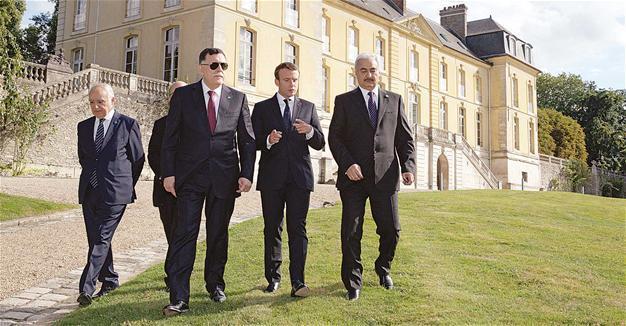Libyan rivals agree on cease-fire, election
 Two rival Libyan leaders committed themselves on July 25 to a cease-fire, working toward presidential and parliamentary elections and finding a roadmap to secure lawless Libya against terrorism and trafficking of all kinds, according to a document released by the French presidency.
Two rival Libyan leaders committed themselves on July 25 to a cease-fire, working toward presidential and parliamentary elections and finding a roadmap to secure lawless Libya against terrorism and trafficking of all kinds, according to a document released by the French presidency.The meetings at a chateau in La Celle Saint-Cloud, west of Paris, brought together Fayez Serraj, prime minister of the U.N.-backed unity government, and Gen. Khalifa Hifter, the Egyptian-backed commander of Libya’s self-styled national army.
Macron met separately with each ahead of an encounter between the two Libyans in the presence of U.N.’s newly appointed special envoy for Libya, Ghassan Salame.
“There is political legitimacy in the hands of Mr. Serraj. There is military legitimacy is in the hands of Mr. Hifter. They have decided to work together,” Macron said after the series of encounters. The 10-point joint declaration that capped the talks was the first of its kind between the rivals.
Among the points agreed upon was a commitment to a cease-fire with armed force reserved “strictly” for use in counter-terrorism operations.
The rivals also “solemnly commit to work toward the holding of presidential and parliamentary elections as soon as possible.”
The French president said later that the goal is for balloting in the spring. Serraj had said in May that elections would be held in spring. The date may seem premature in a country that has spiraled into chaos since the 2011 toppling and killing of leader Moamar Gadhafi. But French diplomats had said before the meeting that they would support such an initiative.
“The stakes of this reconciliation are enormous. Enormous for the Libyan people, who have been suffering, living with instability and terrorist threats these past years, and it is considerable for the whole region,” Macron said after the talks.
















